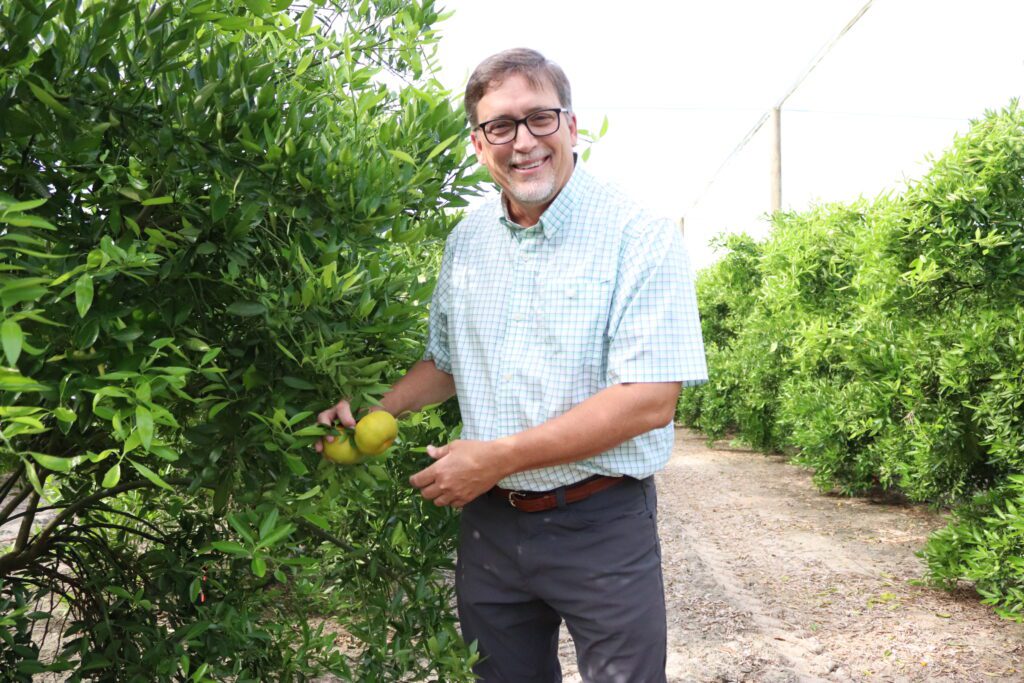Brothers Jerry and Keith Mixon Keep Trees Thriving With Citrus Under Protective Screens
by PAUL CATALA
While growers throughout the state battle citrus greening, there are at least two growers who are giddy with excitement as their crop matures. It may not be a matter of how they are growing their crop that gives them the edge. Rather, it’s a matter of where. The answer: under cover.
Jerry and Keith Mixon have an operation that has yielded acres of success, all under protective screens that stave off the Asian citrus psyllid.
Since July 2018, the brothers have owned and managed Mixon Family Farms, a 60-acre compound of about 20,000 trees using a method called Citrus Under Protective Screen. CUPS, as it’s called, is a system that uses protective, high-density polyethylene screens to protect the crop from citrus psyllids while minimizing the amount of fertilizer, water and pesticides necessary to yield high-quality fruit.
Since its conception in 2015, the CUPS growing method has gained in popularity as citrus greening continues to ravish groves around Florida.
The CUPS system originated at the University of Florida’s Institute of Food and Agricultural Sciences (UF/IFAS) Indian River Research and Education Center in Fort Pierce and was first tested at UF/IFAS Citrus Research and Education Center in Lake Alfred. Since then, approximately 300 to 400 acres of CUPS groves have sprung up around the state.
During a recent workday at Mixon Family Farms in Alturas, the Mixons – along with Mixon Family Farms manager Sean Brantley — peruse their CUPS crops. Among them: 40 acres of Early Pride, a low-seed, early-maturing mandarin hybrid tangerine; 10 acres of Bingo, seedless Mandarin oranges; 5 acres of Sugar Belle, a mandarin hybrid that resembles the bell-shaped Minneola tangelo; and 5 acres of low-acid, vibrantly colored grapefruit.
All of the Mixons’ trees are thriving under the cover of the screens on the former abandoned outdoor citrus farm operation. Aside from protection from the citrus psyllid and other pests, the benefits of CUPS include the protection of natural resources and decreased need for pesticides and fertilizer. The system encourages faster growth, produces higher quality and yields per acre and ensures high levels of food safety and security.
According to the Mixons, the cost of their CUPS structures was between $25,000 to $30,000 per acre. IFAS states CUPS can significantly increase the cost of planting a citrus grove due to the high cost of screen house construction, which can be up to $1 per square foot. Additionally, the 40- to 50-mesh high-density polyethylene screen may need replacement every seven to 10 years at up to 50 cents per square foot.
It took approximately nine months to construct the Mixons’ screens through an Apopka-based contractor. The Mixons built another 40 acres on their own.
“It proves the concept you can really produce with these screens,” Jerry says, holding a sliced grapefruit. “I’ve been able to harvest all of the citrus – we hit a perfect window. It’s a relatively small operation. I can come out here, enjoy and make sure it’s all going in the direction we charted for the year.”
Keith, a Jacksonville native and 1981 graduate of Winter Haven High School, says with CUPS, Mixon Family Farms is targeting a harvest of 400 to 600 boxes of fruit per acre; an outdoor grove might get about 200 per acre. He adds that much of that production is due to the CUPS minimizing plant predation by the citrus psyllid, which contributes to greening and wind damage to trees in high-wind situations – tropical storms, tornadoes and hurricanes.
“The citrus psyllid is larger than the net openings. With CUPS, we’ve excluded all the large pests, which in turn, helps prevent greening,” adds Keith.
According to IFAS, for a CUPS production system to be profitable, the higher cost of CUPS must be offset by the highest possible yield of premium-quality fresh fruit with a high market price, which has been on an upward trend in recent years. That can partly be attributed to having the Florida Department of Agriculture and Consumer Services’ “Fresh from Florida” name, which promotes Florida agricultural products through consumer marketing campaigns and partnerships.
“We can take advantage of (CUPS) and produce really great quality fruit. ‘Fresh from Florida’ means a lot,” says Jerry, a 1979 graduate of Winter Haven High School.
Using the CUPS system, growers can optimize management practices, states IFAS. Those practices include “pest and disease management, planting densities, variety and rootstock selection, irrigation and fertilization, hedging and topping, harvesting, and marketing,” which the Mixon brothers also mention.
As they make a final lap around one of the CUPS groves, Jerry mentions he and his brother also have lime and lemon trees into their groves, “just to see what they’d do in these structures.” As they stand at a lime tree, he says so far, those trees have done “amazingly” – just as the rest of their citrus crops have done.
Overall, Jerry and Keith say they foresee CUPS growing and harvesting becoming more popular as greening and development continue to decimate traditional citrus-growing techniques and groves.
“It helps produce what customers want – high-quality, good-looking, thin-skin, tasty fruit. I think they’ll compete with any other fruit out there,” says Keith. “(CUPS) kind of opened up a window because with greening, we had struggled with taste, appearance and productivity. The system has been really succeeding out there and our passion is to have great tasting, beautiful fruit; this system does that.”

